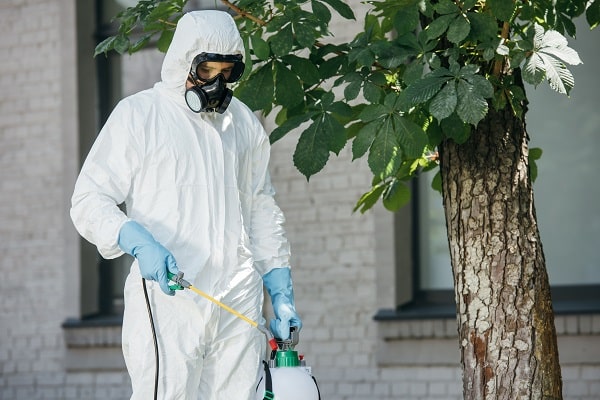The use of pesticides by farmers has become a common practice all around the globe. They are used in agricultural fields and forests and on roads, buildings, parks, schools, and homes. From farmlands to our kitchen sinks, our entire world is filled with harmful pesticides. In conclusion to the above statements, you will find pesticides everywhere, be it air, food, water, and soil.
Apart from that, many types of research and studies have linked pesticides to various health conditions. Be it short-term impacts such as nausea and headaches or chronic impacts like endocrine disruption, reproductive harm, and cancer.
Contents
Pesticides Are Harmful To Soil, Insects, And Humans

As mentioned in the above paragraph, researchers have linked pesticides to various health issues, including short or chronic impacts.
Pesticides are not only harmful to human beings but also agricultural land and various insect species. Many insect species can naturally limit and control the pest population and also maintain soil fertility. Using artificial toxic pesticides, we are weakening and damaging the plant’s immune and root system, which will reduce the soil’s ability to observe essential nutrients like phosphorus and nitrogen.
Pesticide Labels

Obtaining the most important few minutes while pest control is the time spent reading all the information provided on the label. The pesticide label contains all the essential information required for effective and safe use. It is essential to read the label on the pesticide container as it provides necessary information such as:
- Ways to use, handle and store the pesticide
- When and how to apply for best results.
- What pest is the product meant for?
Apart from that, make sure the label contains these three pieces of information:
- The name of the pesticide.
- The entire poison schedule in words can provide all the necessary information related to the product’s toxicity level.
- The name of the pesticide chemical and its strength.
Important Note
All the pesticide containers usually have a certain percentage of added actual pesticide chemicals. Apart from that, the other chemicals or substances used in the product may include:
- The solvent used, such as water, helps in dissolving the chemical.
- The caring agent used can easily distribute the chemical.
- List of pest names the product can control.
- All the information related to how much quantity you should use.
- The method and time of application.
- Safety measures and directions for handling the product.
- First aid procedure in case any accident occurs.
- Any warning or special instruction related to usage and disposal of the product.
- The net content of the container.
Reasons To Say No To Pesticides

The increasing demand for modern pesticides means that even gardeners can achieve gorgeous landscapes and green lawns with the help of chemical management. But there are many drawbacks of using pesticides. We have listed a few reasons why you must not use pesticides in your garden and yard for you to know and learn about their danger.
Water Run-Off:
Consistent and excessive use of pesticides can help many harmful toxins enter nearby streams and rivers through your drainage system. It would help if you always thought about your local environment and neighbors before releasing any harmful chemical toxin that can damage any living creatures in the nearby water ecosystem. After all, the creatures in the water are already doing their part in checking and controlling the pest population.
Disrupt Balance:
Our environment system is like a delicate web that also includes your local environment and your backyard! By using toxic pesticides to eliminate one problem, you are unintentionally giving birth to other problems. For example, while using pesticides to eliminate beetles, which can naturally control aphid populations. By doing so, the aphid population may increase rapidly. When this happens, you will need another round of pesticides to control their population, which will create a never-ending chain of pesticides. It would help if you kept in mind that every insect infestation has a logical explanation behind it, so initially start by identifying the root cause and eliminating the leading factor through organic methods.
Harmful for humans:
Inhalation or skin contact can expose any human being to a high amount of harmful chemicals directly linked to a wide range of serious health conditions. For example, research and studies have shown that different types of pesticides can cause a higher risk of cancer, kidney failure, Alzheimer’s disease, and cause developmental problems in small children.
Contaminates food:
According to two reports presented by the Center for Ecogenetics and Environmental Health, pesticides that residue in fruits and vegetables can cause a variety of short and chronic impacts on our health and possibly cause poisoning. Unfortunately, such risks are not eliminated even after washing your fruits and vegetables because the producers have already observed harmful chemicals to their roots.
Kill Pollinators:
Excessive use of pesticides can harm so-called “unwanted bugs,” but they damage beneficial insects like soil microorganisms and worms that help plants thrive. The EPA has recognized pesticides as one reason for collapsing colony disorder, a global phenomenon in which the population of wild bees dropped significantly. Without the wild bees, a significant portion of plants (especially flowering plants) cannot be pollinated, which can cause damage to our entire ecosystem.
Conclusion
Pesticides are substances used for killing harmful insects or animals. They are used in agricultural fields and forests, roads, buildings, parks, schools, and homes. From farmlands to our kitchen sinks, our entire world is filled with harmful pesticides. You can find pesticides everywhere, be it air, food, water, and soil.
Artificial toxic pesticides can weaken and damage a plant’s immune and root system, which will reduce the soil’s ability to observe essential nutrients like phosphorus and nitrogen. This article mentioned all the necessary information related to pesticides, their side effects, information on pesticide labels, and reasons to avoid using pesticides.


